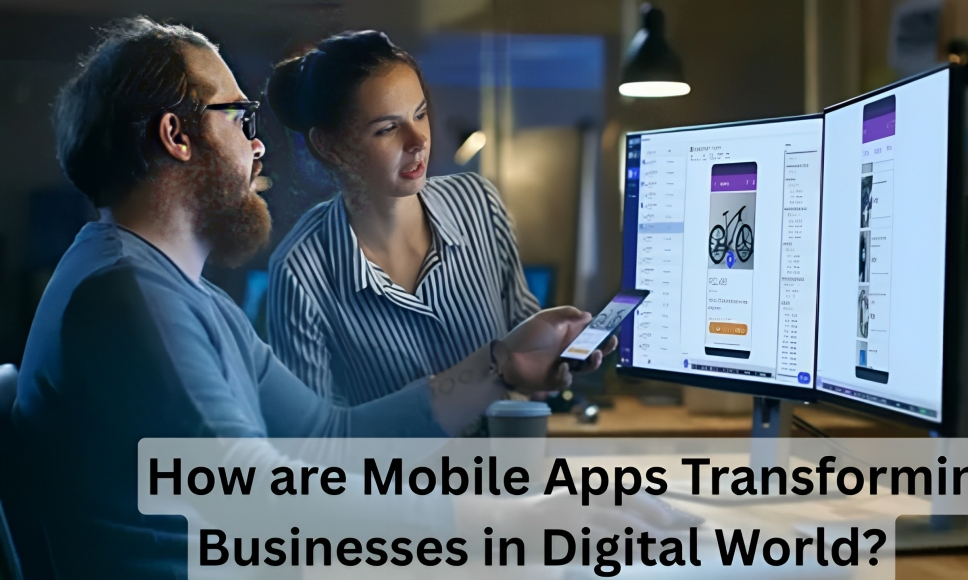Mobile apps have become essential tools for business success in today’s fast-paced digital landscape. Companies across all industries are witnessing unprecedented growth through strategic mobile technology implementation.
The shift toward mobile-first strategy is transforming how businesses connect with customers and streamline operations.
Every successful business today needs a strong mobile presence. The digital transformation happening worldwide has made smartphones an extension of ourselves. This reality creates incredible opportunities for companies ready to embrace mobile solutions.
Mobile Apps Transforming Businesses in Digital World
The first rule of thriving in business is staying connected with your customers. Modern consumers expect quick access to services through their smartphones. This expectation has fueled the rapid growth of custom app development services worldwide.
Digital engagement is at an all-time high. Smartphones have become our constant companions. We use them for shopping, banking, entertainment, and communication. This shift in behavior has created a massive opportunity for businesses to establish deeper connections with customers.
Companies that invest in quality mobile applications see significant improvements in customer loyalty. A well-designed app serves as a direct channel to your audience. It eliminates intermediaries and creates a personal bond with users.
The mobile commerce sector is growing exponentially. Brands that once relied solely on physical stores or websites now generate substantial revenue through apps. The convenience factor has completely changed consumer purchasing habits.
Companies Are Focusing More on Mobile Apps Instead of Mobile Website
Business leaders are increasingly recognizing that apps deliver superior results compared to mobile websites. Apps provide better user experience design and faster performance. These advantages translate to higher conversion rates and improved customer satisfaction.
Mobile websites still have their place. However, they cannot match the functionality and engagement levels of dedicated applications. The statistics clearly show that users spend significantly more time using apps than browsing mobile sites.
Frontend development for apps offers more flexibility than websites. Developers can optimize the interface specifically for each platform. This customization results in a smoother, more intuitive user experience.
Apps stay visible on the user’s home screen. This constant presence serves as a subtle reminder of your brand. Mobile websites get lost among browser tabs and bookmarks.
READ THIS BLOG : Sports Harmonicode: The Future of Smart Training and Athletic Performance
Why are People Spending so much Time Using Mobile Apps?
The answer is simple: convenience and personalization. Apps provide instant access to services without the need to open browsers and navigate to websites. This immediate availability saves valuable time for busy users.
Consumer behavior analytics shows that people value personalized experiences. Mobile apps excel at remembering user preferences and customizing content. This tailored approach makes users feel valued and understood.

Push notifications keep users engaged with timely reminders and updates. These gentle nudges bring users back to the app regularly. No other digital platform offers this level of direct communication.
The user interface optimization in modern apps makes them intuitive and enjoyable to use. Well-designed apps anticipate user needs and simplify complex processes. This thoughtful design encourages repeated use and builds habits.
How mobile apps transforming businesses in the digital world?
Business transformation through mobile technology happens across multiple dimensions. From customer service to internal operations, apps are revolutionizing how companies function in the digital ecosystem.
Enterprise mobility solutions have freed employees from desks. Teams can now collaborate and access company resources from anywhere. This flexibility has boosted productivity and employee satisfaction.
Customer data collection has become more efficient through mobile applications. Every interaction provides valuable insights into user preferences and behaviors. These insights drive better business decisions and product development.
Market penetration has become easier with mobile technology. Apps allow businesses to reach new demographics and geographical regions. The global nature of app stores removes traditional barriers to expansion.
Faster, Simpler and Personalized Communication with the User
Mobile apps create direct communication channels between businesses and customers. This immediate connection eliminates delays and improves customer satisfaction. Questions get answered quickly, building trust and confidence.
Client engagement solutions through mobile apps feel more personal than traditional methods. Users perceive messages received through apps as more relevant and important. This perception leads to higher open and response rates.
Real-time chat features allow customer service teams to solve problems instantly. The efficiency of this approach reduces frustration and increases loyalty. Quick resolution of issues prevents negative reviews and social media complaints.
Personalized notifications based on user behavior show customers you understand their needs. This targeted approach feels thoughtful rather than intrusive. The result is higher engagement and conversion rates.
Utilization of Artificial Intelligence (AI) in Mobile Apps
AI integration has revolutionized mobile app capabilities. Machine learning algorithms continuously improve app performance and personalization. This evolution creates increasingly intuitive user experiences.
Chatbots provide instant customer service around the clock. These AI assistants handle routine inquiries and free human staff for complex issues. The efficiency saves costs while improving customer satisfaction.
Voice recognition technology has made apps more accessible and convenient. Users can navigate and control apps hands-free while multitasking. This functionality is particularly valuable in driving or cooking scenarios.
Predictive analytics anticipate user needs before they’re expressed. Apps can suggest products or services based on past behavior. This proactive approach feels magical to users and drives additional sales.
Internet of Things (IoT) Mobile Apps are Connecting the World
IoT applications allow users to control physical devices through their smartphones. Everything from home thermostats to industrial equipment can be managed remotely. This connectivity creates unprecedented convenience and efficiency.
Business process automation through IoT apps reduces human error and operational costs. Routine tasks can be scheduled and monitored without manual intervention. The resulting efficiency gives companies a competitive advantage.
Data from connected devices provides valuable insights for product improvement. Companies can monitor how their products perform in real-world conditions. This feedback loop accelerates development cycles and innovation.
Smart home technology has created new markets for app-controlled devices. Lighting, security, appliances, and entertainment systems all connect to mobile apps. This integration simplifies daily life and creates loyal customers.
Location-Based Services (LBS) are Capitalizing on GPS
Retail businesses use location services to send timely offers to nearby customers. These perfectly timed promotions significantly increase foot traffic and sales. The relevance of location-based marketing creates higher conversion rates.
Navigation features help customers find physical business locations easily. Clear directions reduce frustration and missed appointments. This convenience enhances the overall customer experience.
Market segmentation analysis based on location data reveals valuable patterns. Businesses can identify high-value neighborhoods and optimize marketing accordingly. This targeted approach improves return on advertising investment.
Service businesses use GPS tracking to coordinate field operations efficiently. Dispatchers can assign jobs to the nearest available technician. This optimization reduces travel time and increases daily completion rates.
Using Technology and Digitalization to Enhance User Engagement
Gamification elements make routine interactions fun and rewarding. Points, badges, and challenges motivate users to engage regularly. These playful elements transform ordinary tasks into enjoyable experiences.
Interactive content keeps users active rather than passive. Quizzes, surveys, and configurators invite participation. This engagement creates memorable brand experiences and valuable data collection opportunities.

Digital customer journey mapping helps identify and remove friction points. Companies can continuously refine the app experience based on user behavior. This iterative improvement process leads to higher satisfaction and retention.
Social sharing features extend app content beyond the original user. Easy sharing options turn satisfied customers into brand ambassadors. This organic promotion reaches high-quality potential customers.
Quick, Convenient yet Secure Payment Process
One-click purchasing removes friction from the buying process. Saved payment information makes transactions nearly instantaneous. This convenience significantly reduces cart abandonment rates.
Data security protocols protect sensitive customer information. Strong encryption and authentication measures build trust. Customers feel confident making purchases through secure apps.
Digital wallets streamline payments across multiple businesses. Users appreciate the convenience of centralized payment management. This simplicity encourages more frequent transactions.
Contactless payment options have become increasingly important. Many customers prefer touchless interactions for health and convenience. Businesses that offer these options gain competitive advantage.
Making Better Business Decisions through Real-Time Analytics
Mobile apps generate valuable application performance metrics in real time. Businesses can monitor user behavior and identify improvement opportunities immediately. This rapid feedback loop accelerates development and optimization.
Heat mapping shows exactly how users interact with app interfaces. Developers can see which elements attract attention and which get ignored. This visual data guides interface redesign for better results.

Conversion tracking reveals exactly where users abandon processes. These insights allow businesses to fix problems in the purchase funnel. The result is higher completion rates and increased revenue.
A/B testing through mobile apps guides feature development. Companies can test variations with different user segments simultaneously. Data-driven decisions replace guesswork and personal preferences.
READ THIS BLOG : Ed Sheeran Details the Lovestruck Jitters in Sweet New Single “Shivers”
What’s the Future of Mobile Apps in Business World?
The integration of augmented reality will transform customer experiences. Virtual product trials and immersive brand experiences will become standard. These innovations will create new levels of engagement and confidence in purchasing decisions.
5G technology will enable richer, more complex mobile applications. Faster connections will support high-definition video and massive data transfers. These capabilities will open new possibilities for mobile business solutions.
Tech innovation will continue to blur lines between physical and digital experiences. Mobile apps will increasingly control and enhance real-world interactions. This integration will create seamless customer journeys across channels.
Blockchain integration will revolutionize security and transaction verification. Decentralized data structures will protect sensitive information. This technology will build unprecedented trust in digital business processes.
Frequently Asked Question
How much does it cost to develop a business mobile app?
Development costs vary widely based on complexity and features. Simple apps may cost $20,000-$50,000, while complex enterprise solutions can exceed $250,000.
How long does it take to develop a custom business app?
Most business apps take 3-6 months from conception to launch. Larger enterprise applications may require 9-12 months of development time.
Which platform should my business develop for first: iOS or Android?
The decision depends on your target audience demographics. Research your customers’ device preferences before choosing a platform.
How can I measure the ROI of my business mobile app?
Track key metrics like user acquisition cost, retention rates, and conversion values. Compare these against development and maintenance expenses.
What security measures should my business app include?
Essential security features include encrypted data storage, secure authentication, regular security audits, and compliance with relevant regulations.
Conclusion
Mobile apps have fundamentally transformed how businesses operate in the digital world. The right mobile strategy creates powerful competitive advantages through enhanced customer engagement, operational efficiency, and data-driven decision making.
Companies that invest wisely in mobile app functionality position themselves for long-term success. The intimate connection that well-designed apps create with customers builds loyalty that competitors cannot easily disrupt.As technology continues advancing, mobile applications will remain at the center of digital business transformation. Businesses that adapt quickly to emerging mobile trends will thrive in increasingly competitive markets.

jack is an experienced blogger and a passionate wordsmith at Phrase Pioneers. With a keen eye for language and a deep love for writing, she shares insightful posts on grammar, phrases, and the art of communication.
















